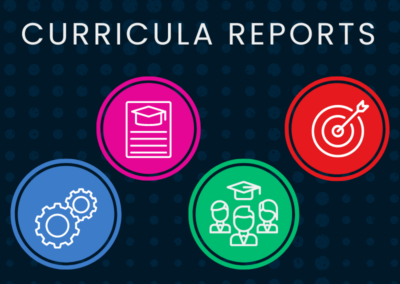Why should you implement an innovative strategy within your school? International education expert and guest panelists addressed this question through the lens of three emerging aspects of school life during the ISC Research Edruptors@School conference in June:
- How to successfully implement hybrid learning
- Cybersecurity in education technology and how leaders can keep all members of the school community safe online
- And how innovative school strategies such as virtual reality and the metaverse in education may become foundational learning resources of the future
Successful implementation of hybrid learning
Beginning the hybrid learning session, Philippa Wraithmell, digital education specialist, encouraged school leaders to consider all possible needs as a school when selecting technology. This involves thinking about communication, safety, and building capacity. Concentrate on communication with all stakeholders including your international community, and how the technology will enable you to do that effectively with active engagement, she advised. Philippa stressed the importance of considering cultural differences and expectations within the school community that will impact everyone’s understanding of safety. She recommended that school leaders should look at the values of their school and align the curriculum and school values with the technology used by the school. “Dive into something new”, she suggested, and “start to build that strategy of what you want to be able to achieve.”
Sabina Pecoraro, Assistant Headteacher at Emirates International School Jumeirah, spoke about the use of a hybrid model post-COVID, suggesting that it can maximise the productivity, scalability, and flexibility of learning. She emphasised the need for the upskilling of school leaders and teachers to promote student engagement. “As educators, we need to keep upskilling ourselves so that we are technology focused and can continually be adapting to keep our students engaged,” she said. However, to deliver collaborative, innovative, and intuitive teaching methodologies to students, teacher access to the right technology and resources is crucial, she outlined.
Dr Vandana Lulla, Principal at Podar International School talked about being a paperless school with the goal of a sustainable future, highlighting the opportunities and challenges faced. When adapting to the online mode of teaching during the pandemic, Vandana highlighted the need to tweak the curriculum and ensure innovative teaching resources were accessible. To improve the curriculum, Vandana emphasised the importance of gathering feedback alongside providing parents and teachers with an enhanced support network: offering coffee mornings, buddy systems, step-by-step videos, and more. “Parents, teachers, and students had access anywhere and anytime: there was consistency,” she said.
Crucial awareness around cybersecurity in edtech
The second session of the day involved Matt Harris, co-founder, and CEO at ChildSafeguarding.com, and Bethan Eveleigh, online education and safeguarding specialist. Both experts urged the importance of cultivating knowledge and awareness around the risks of technology, sharing strategies and recommendations for stakeholders to implement protective measures in schools.
Bethan addressed who should be responsible for cybersecurity within a school. “Life for most people is online, so the message to international school leaders is that it’s everyone’s responsibility,” she said. She explained the significance of teaching students and staff how to be safe online. “If we don’t teach students how to be safe, how can they be? Teaching them about technology and the virtual world is our responsibility for our young people’s future,” she insisted.
Matt discussed the cybersecurity challenges most schools face, outlining the need for a preventative measure of ‘walled gardens’ in the digital space. He shared real examples of incidents and emphasised that everyone must know the processes regarding cyber protection and safety. “External risks are the ones that are increasing the most…tending to be the most impactful,” he said. However, Matt spoke of the lack of awareness that some school staff have about the internal risks which can impact the whole school when they occur.
Pioneering school strategies: VR and the metaverse
The final session of the day prompted an inspirational discussion around innovative school strategies and shifting the mindsets of school leaders.
Dwayne Matthews, Head of School, Innovation and Partnerships at Ontario Virtual School, kicked off the discussion by talking about the paradigmatic shift of immersive learning. “It allows us to connect with communities in much more meaningful ways, with increased inclusivity, as well as developing skills in different ways,” he said. Dwayne believes we should consider technology, including virtual reality, as tools for the school. However, he stressed the need to understand the purpose of technology and its use within the school environment, particularly within the classroom. Teachers should know if they are “substituting, augmenting, or transforming the learning with the support of technology,” he said. He added that, regardless of innovative technology, the role of teaching has not changed. “We are preparing students for the future and about their future preparedness to contribute to the greater whole,” he said.
Nathan O’Grady, Virtual Reality/Augmented Reality (VR/AR) and eSports Lead at King’s InterHigh, part of the Inspired Education Group, covered the risks and challenges associated with moving into an immersive learning terrain. He explained that safeguarding is a significant risk, alongside ensuring technology remains curriculum aligned. “A key risk is the balance of strategic use rather than overuse of this technology,” he said. Challenges include recognising that not all schools have equal funding or access to technology, onboarding, and overcoming barriers to learning. “An important point to recognise is that this is a different type of technology than we have had before,” he expressed. Nathan encouraged school leaders to not fear the change but instead to “embrace the opportunities that it can bring to a wide variety of people.”
Dr Jeremy Williams, Vice President of Community for Monax Labs, a web3 infrastructure studio, spoke about web3. Web3 is in its early days with a long way to go, but the fundamental building blocks of web3 are important to understand, he told delegates. Jeremy discussed the challenges around the ability to adopt technology. “There has got to be conversation around the value that technology is adding to students; maybe this is virtual reality, maybe it is not,” he said. “If it’s only a substitution for an alternative tool, then it can be a harmful scenario,” he warned. A bigger priority for some schools is to focus on the infrastructure first before getting distracted by assets, he advised.
Thank you to Pearson and Discovery Education for sponsoring the day two discussion sessions. For those who registered for the online conference, recordings of all panel discussions are available through the Edruptors@School Whova platform until September.




